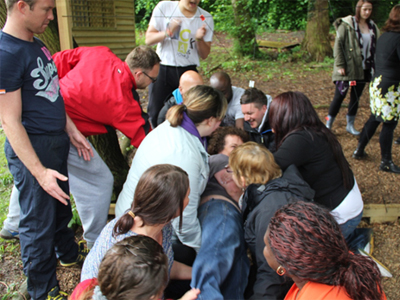
By Jane Lloyd, Cath Larkins, Lowis Charfe, Anthony Moorcroft and Susan Bramwell, School of Social Work, University of Central Lancashire
Social pedagogy is a concept lots of social workers have probably heard of, but many might be uncertain about what it entails in practice with children and other service users. A new module we developed (supported by a Lancashire county council colleague who had experience from a national pilot) brought together undergraduate social work students, looked after young people and residential childcare staff to share a social pedagogy learning experience as peers. Although just one module, the outcomes suggest the focus on relationships and sense of equality could become a beneficial aspect of social work training.
Social pedagogy is well-established within social work in western Europe; although the term has been known in the UK for some years, it is not widely practised. Social pedgagoy uses a relationship-based approach and aims to combine academic knowledge and an understanding of emotions in the context of hands-on practical work – ‘a holistic humanistic approach’ (Gabriel Eichsteller). It encourages non-traditional teaching approaches and creative, experimental tasks.
Sessions took place at the university. We worked with the physical environment of lecture theatres, classrooms and outdoor areas in different ways – using discussion circles, posters and photographs on walls. This reinforced the sense that “lecturers were in a place of equality” (student comment) and that everyone’s contributions were valued and equal.
The activities reflected the centrality of rights, social justice and relationships that are crucial to social pedagogy. Critical reflection helped participants understand events and interactions and relate them to the theory. We used space creatively to provide group learning opportunities with an emphasis on problem-solving tasks. It facilitated non-hierarchical relationships; and a mix of pair, small and large group experiential learning activities. One activity involved the whole group working together to pass themselves through a giant spider’s web (pictured). In another, students and young people helped each other negotiate their way around a car park whilst blindfolded.
Participants reported increased confidence, improved communication and reflective skills and the opportunity to build trusting relationships, enabling them to feel safe to try out new things.
How do the students think the module will impact on their practice? The most notable change is the value placed on young people’s options and views. One said that her approach has shifted from a focus on managing risk, to one which recognises that young people are on a learning journey. Supporting them to build capacity and confidence on that journey is vital to practice.
They also made links made between social pedagogy and other theories, such as strengths-based and person-centred approaches. For example, we talked regularly about the idea of the ‘common third’ – if you and the child are two points on a triangle, this third refers to the use of shared activities to strengthen your relationship, to develop new skills together, as equals. One, student who is a youth worker said this approach made her focus much more on young people’s capabilities and that “when faced with problem-solving, I now discuss the issues with young people and we seek answers together.”
One of the looked-after young people told us that for the first time in his life, he didn’t feel like an outsider. Others reported that the experience has opened up new opportunities including starting college courses, and joining other group-based activities. One said that: ‘social pedagogy is like, all being equal’ and all staff working with young people should learn about alternatives to hierarchical relationships.
Social pedagogy modules are currently offered on non-professional courses within the school of social work at UCLan and the authors are developing a pilot module on the undergraduate social work degree.


 ‘Dear Sajid Javid: please end the inappropriate detention of autistic people and those with learning disabilities’
‘Dear Sajid Javid: please end the inappropriate detention of autistic people and those with learning disabilities’ Ofsted calls for power to scrutinise children’s home groups
Ofsted calls for power to scrutinise children’s home groups Seven in eight commissioners paying below ‘minimum rate for home care’
Seven in eight commissioners paying below ‘minimum rate for home care’ Children and young people with SEND are ‘valued and prioritised’ in Wiltshire, find inspectors
Children and young people with SEND are ‘valued and prioritised’ in Wiltshire, find inspectors 
 Facebook
Facebook X
X LinkedIn
LinkedIn Instagram
Instagram
Comments are closed.